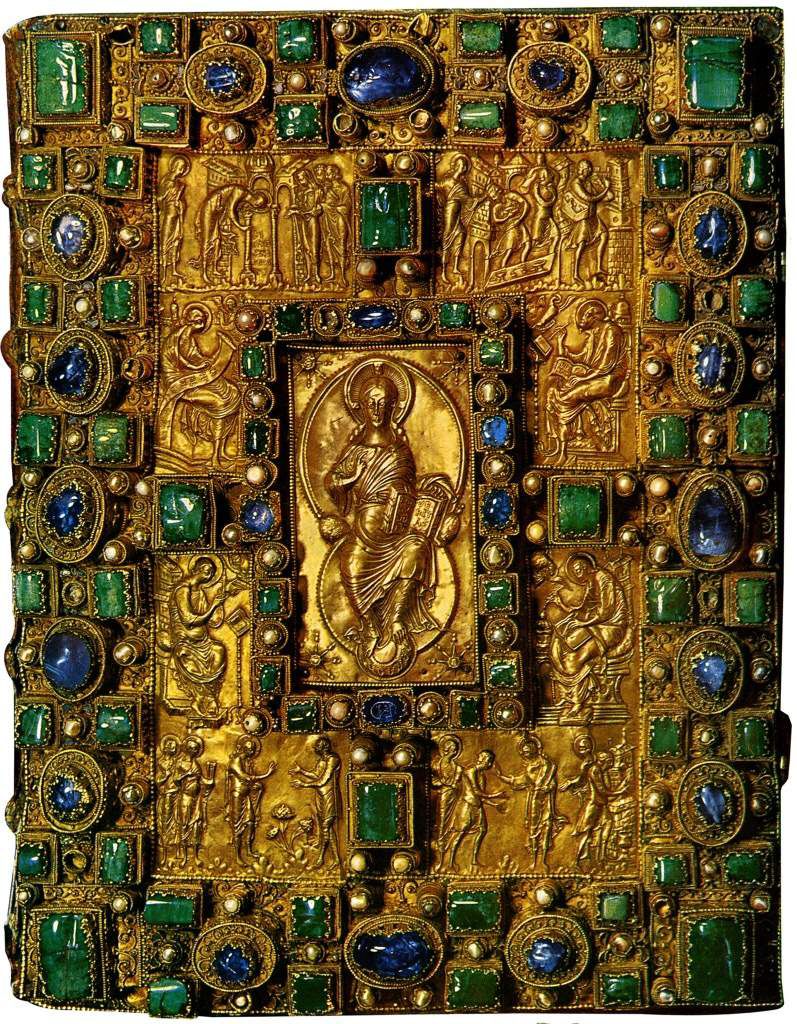It's been said, “A library is infinity under a roof.”
Some libraries come close to that!
A thread of 12 of the world's largest libraries and their most priceless treasures:
1. The British Library, London
200 million volumes, including the Lindisfarne Gospels (~715).



Some libraries come close to that!
A thread of 12 of the world's largest libraries and their most priceless treasures:
1. The British Library, London
200 million volumes, including the Lindisfarne Gospels (~715).



2. The Library of Congress, Washington, D.C.
175 million volumes, including Thomas Jefferson's original rough draft of the Declaration of Independence


175 million volumes, including Thomas Jefferson's original rough draft of the Declaration of Independence


3. The Shanghai Library
57 million volumes, including early Buddhist sutras, like the Vimalakīrti Nirdeśa


57 million volumes, including early Buddhist sutras, like the Vimalakīrti Nirdeśa


4. The New York Public Library
55 million volumes, including the Lenox copy of the Gutenberg Bible, the first copy to be acquired by a United States citizen.


55 million volumes, including the Lenox copy of the Gutenberg Bible, the first copy to be acquired by a United States citizen.


5. The Russian State Library, Moscow
48 million volumes, including the ~1092 Archangelsk Gospel, written in Old Church Slavonic


48 million volumes, including the ~1092 Archangelsk Gospel, written in Old Church Slavonic


6. The National Diet Library, Tokyo & Kyoto
44 million volumes, including countless rare woodblock prints and an early copy of Confucius's Analects


44 million volumes, including countless rare woodblock prints and an early copy of Confucius's Analects


7. The Royal Library of Denmark, Copenhagen & Aarhus
43 million volumes, including:
• Primer nueva corónica y buen gobierno, a rare 1200-page handwritten account of Andean life pre-Spanish conquest
• the 11th-cent. Copenhagen Psalter



43 million volumes, including:
• Primer nueva corónica y buen gobierno, a rare 1200-page handwritten account of Andean life pre-Spanish conquest
• the 11th-cent. Copenhagen Psalter



8. National Library of China, Beijing
43 million volumes, including:
• the fragments of the Xiping Stone Classics from ~ AD 175
• the most complete copy of the Yongle Encylopedia from ~1400



43 million volumes, including:
• the fragments of the Xiping Stone Classics from ~ AD 175
• the most complete copy of the Yongle Encylopedia from ~1400



9. University of California Libraries
40 million volumes, including the Tebtunis papyri, a massive collection of Ptolemaic-era writings in Demotic Egyptian and Koine Greek on papyri that had been recycled as mummy wrappings.


40 million volumes, including the Tebtunis papyri, a massive collection of Ptolemaic-era writings in Demotic Egyptian and Koine Greek on papyri that had been recycled as mummy wrappings.


10. Bibliothèque Nationale de France, Paris
40 million volumes, including:
• the Codex Sinopensis, a 6th-cent. illuminated Greek Gospel
• the Ashburnham Pentateuch, a 6th-cent. illuminated Latin Old Testament



40 million volumes, including:
• the Codex Sinopensis, a 6th-cent. illuminated Greek Gospel
• the Ashburnham Pentateuch, a 6th-cent. illuminated Latin Old Testament



11. National Library of Russia, St. Petersburg
36 million volumes, including:
• an 8th-cent. edition of Bede's Historia Ecclesiastica Gentis Anglorum
• the 11th-cent. illuminated Trebizond Gospel
• the Breviary of Mary, Queen of Scots that she carried to her execution



36 million volumes, including:
• an 8th-cent. edition of Bede's Historia Ecclesiastica Gentis Anglorum
• the 11th-cent. illuminated Trebizond Gospel
• the Breviary of Mary, Queen of Scots that she carried to her execution



12. Bayerische Staatsbibliothek, Munich
34 million volumes, including:
• Breviary of Alaric (an AD 506 Visigothic-Roman law book)
• Codex Aureus of St. Emmeram (a Carolingian Gospel Book from ~870)
• Carmina Burana (an 11th-cent. collection of secular poems)



34 million volumes, including:
• Breviary of Alaric (an AD 506 Visigothic-Roman law book)
• Codex Aureus of St. Emmeram (a Carolingian Gospel Book from ~870)
• Carmina Burana (an 11th-cent. collection of secular poems)



Which of these libraries (and rare manuscript collections) would you most like to visit?
I think Bibliothèque nationale de France’s illuminated manuscripts would be amazing to see.
If you enjoyed this thread, please do me a favor and share the first post, linked below.
I think Bibliothèque nationale de France’s illuminated manuscripts would be amazing to see.
If you enjoyed this thread, please do me a favor and share the first post, linked below.
https://twitter.com/coffeewclassics/status/1762610399306723608
• • •
Missing some Tweet in this thread? You can try to
force a refresh






















